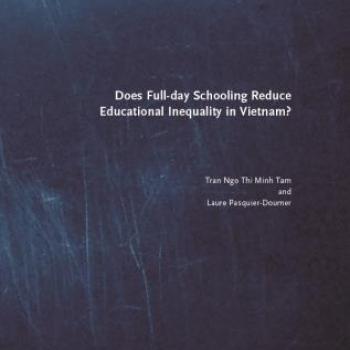Publication Information

Privatization of the education sector has recently emerged in many low- and middle- income countries. This paper contributes empirical evidence to the ongoing discourses by looking into full-day schooling and educational inequality in Vietnam. Full-day schooling was implemented initially to deal with deficiencies in primary instructional time in Vietnam. Using data from the Vietnam Young Lives School Survey (2011), this paper examines whether full-day schooling decreases educational inequality. Specifically we examine how the transition from private extra classes to full-day schooling and accompanied school resources affect the gap in learning achievement between children from different social backgrounds.
Analysis results show that full-day schooling improves student learning progress. However full-day schooling does not narrow the inequality in education, and appears to associate with the rising gap in learning progress. Among students that attend full-day schooling, those from more-advantaged backgrounds have more instruction, better resources and obtain higher learning progress in comparison with those from more disadvantaged backgrounds. Higher attendance in full-day schooling magnifies the effect of social background on learning progress.

Privatization of the education sector has recently emerged in many low- and middle- income countries. This paper contributes empirical evidence to the ongoing discourses by looking into full-day schooling and educational inequality in Vietnam. Full-day schooling was implemented initially to deal with deficiencies in primary instructional time in Vietnam. Using data from the Vietnam Young Lives School Survey (2011), this paper examines whether full-day schooling decreases educational inequality. Specifically we examine how the transition from private extra classes to full-day schooling and accompanied school resources affect the gap in learning achievement between children from different social backgrounds.
Analysis results show that full-day schooling improves student learning progress. However full-day schooling does not narrow the inequality in education, and appears to associate with the rising gap in learning progress. Among students that attend full-day schooling, those from more-advantaged backgrounds have more instruction, better resources and obtain higher learning progress in comparison with those from more disadvantaged backgrounds. Higher attendance in full-day schooling magnifies the effect of social background on learning progress.

